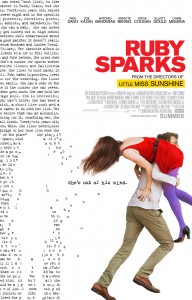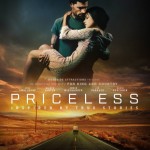 Have you ever been so lonely that you created an imaginary ‘ideal mate’ in your mind that you could could talk to and who would love you just the way you are – and then have that exact person appear in your home out of nowhere?
Have you ever been so lonely that you created an imaginary ‘ideal mate’ in your mind that you could could talk to and who would love you just the way you are – and then have that exact person appear in your home out of nowhere?
Me neither. But that’s the premise of the new indie romantic-comedy-drama “Ruby Sparks,” about a twenty-something author named Calvin (Paul Dano) who doesn’t have any real friends and who still hasn’t gotten over being dumped by his girlfriend of five years. Suffering from severe writer’s block, Calvin tells his psychiatrist (Elliott Gould) that he longs for human companionship, but he doesn’t seem able to actually connect with another person on any kind of meaningful level. The doctor gives him the assignment of writing about his ideal girlfriend, so at least he’s got something to work toward.
Calvin follows through and starts developing a woman he’s been seeing in his dreams. He names her Ruby Sparks, and she embodies everything he wants in a woman. In fact, he enjoys dreaming about her so much that he longs for the moment he can go to sleep at night because they’re imaginary relationship is better than anything he’s got in real life. When he wakes up in the morning, he writes down what transpired overnight.
 One morning, Calvin wakes up and finds Ruby (Zoe Kazan, who also wrote the script) in his apartment. At first, he thinks he’s losing his mind. When he realizes that other people can see her and interact with her too, he accepts the fact that she’s real. Calvin has created another human being with his mind and his typewriter (yes, he uses a typewriter. Thankfully I didn’t hear anyone in the theater asking “What’s that?”).
One morning, Calvin wakes up and finds Ruby (Zoe Kazan, who also wrote the script) in his apartment. At first, he thinks he’s losing his mind. When he realizes that other people can see her and interact with her too, he accepts the fact that she’s real. Calvin has created another human being with his mind and his typewriter (yes, he uses a typewriter. Thankfully I didn’t hear anyone in the theater asking “What’s that?”).
When Calvin’s married brother reads what he’s written about Ruby, he points out that she’s not a real woman; she’s an ideal. Real women, he says, aren’t perfect all the time, don’t always do what you want, and can still be a mystery even when you’ve known them for years. Calvin doesn’t really care about his brother’s opinion because everything is going the way he wants for the first time in his life. If he doesn’t like something about Ruby, he just goes to his typewriter, types a change in her behavior, and it is accomplished.
Though this specific situation isn’t exactly relatable to the average viewer, it can reflect couples who are newly in love projecting their ideals onto the other person. It’s only over time – and with open eyes, mind and heart – that couples eventually get to know each other as they really are. Some don’t discover that until after the wedding because they’re blinded by their fantasy. That may be why we have such a high divorce rate. Eventually though, the lesson gets learned.
The movie initially plays Calvin’s control of Ruby for laughs. As the story progresses, however, it becomes more problematic and reflective of one of the film’s central themes. The more Ruby is in the world, the more she grows and longs for a life and friendships of her own. Calvin, on the other hand, wants her to be happy just focusing on him. To stop her from possibly leaving him, Calvin heads to his typewriter and changes Ruby’s choices again.
Though he initially comes across as a nice guy, this constant focus on his own needs to the detriment of Ruby’s reveals a selfishness in him. Real love is other-centered; what Calvin feels is self-centered. It’s not the good of the other he wants, but rather a shallow form of worship. I use the word “worship” on purpose because Calvin is a god of sorts in this story. Not the capital “G” God who creates out of love; he’s a small “g” god who creates out of neediness and the desire to control. I don’t know if it was a conscious choice by Kazan to address the issue of free will in the story, but it looms large in the subtext. For Christians, it depicts a prime example of how twisted a life without free will would be. Yes, free will can bring about a lot of undesired results, but the alternative is even worse.
The conflict between Calvin and Ruby eventually reaches a tipping point in which the author must decide to continue controlling her or come up with some other solution. The couple – played by Dano and Kazan who are a real-life couple – alternate between ease and tension in their onscreen relationship so that may carry over from their off-camera coupling. Despite Calvin’s selfishness, Dano doesn’t play him as a character you hate; just one you wish would mature. And Kazan’s Ruby is a charming sprite who you want to see develop beyond her creator-imposed boundaries.
“Ruby Sparks” is not a movie for everybody, especially in terms of a Christian audience. It’s rated R for a scene of drug use, and for vulgar language and sexual themes being discussed throughout (though there is no actual nudity). On the positive side, it confronts young couples with some important questions about love: do you see your boyfriend/girlfriend or husband/wife as the person they are – or the person you want them to be? Is your relationship based on a humble, self-sacrificing love of the other – or is it mostly about you? Just exploring and discussing those questions with your significant other could stir up some interesting conversations.n











